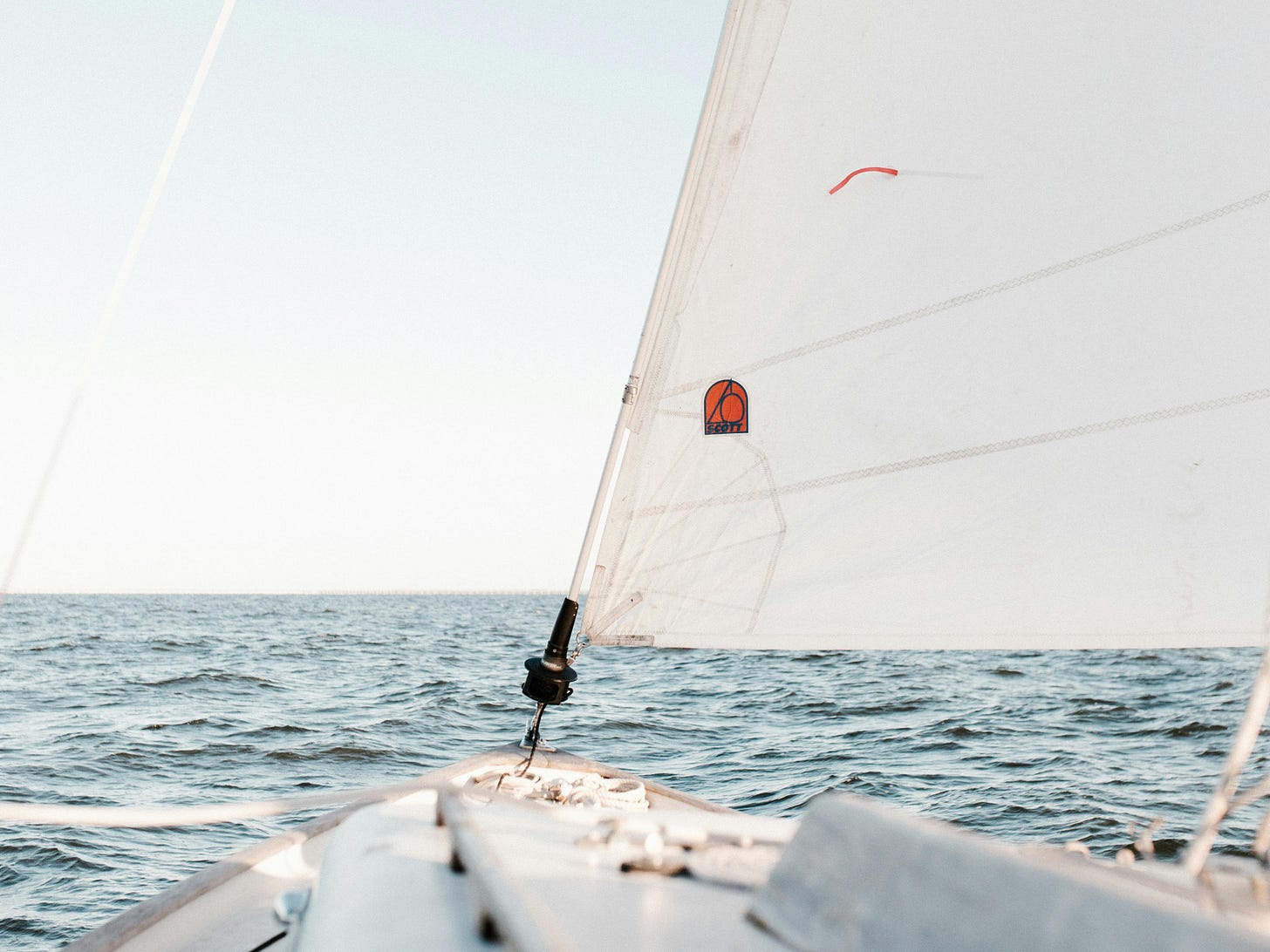
There is a line from the 2004 tennis flick Wimbledon that has always stuck with me: "That's what's tough about this game. There's a winner and there's a loser. And tomorrow one of you is going to be a loser." I guess I am revealing my love for early 2000s rom-coms with my last post in mind, but we’ll explore what that says about me another day, okay? What resonates about this line is that in order to win, we also have to expose ourselves to loss. In sports, we generally accept there is a winner and a loser, but when it comes to life—when it comes to judgments of right or wrong—the terms “winner” and “loser” become more abstract, less black and white, and more grey. Disagreements aren’t scored; we can’t determine who is right or wrong using a defined points system. Being right or wrong becomes hard to accept, to own, or even to grasp.
I have been sitting with this idea of being wrong over the past few weeks after an unfortunate disagreement that has left me rattled. After fielding insults and feeling attacked, processing the root of the disagreement and exploring alternate paths of addressing these assaults on my character I have spent a significant amount of time reflecting how two people could react so differently to the same situation. Of course we all have different perspectives, but when two parties disagree on the same matter and one chooses to be loud and upset and another quiet and composed, there is clearly something amiss. Wrongness becomes less about the issue at hand, and more about how we react, how we handle ourselves. I have started to asses being wrong, and what makes one inherently wrong wondering, does bullying make you inherently wrong? Can a reaction paint a picture of wrongness alone? Does playing defense in fact, weaken your play? These questions have been mulling in the pepper grinder of my mind, as I try to make peace —quietly and gracefully—with this quarrel I’ve found myself hurled into.
After much reflection, conversations with trusted friends, and investigation, I have come to some important realizations. First, taking the high road—the road of being a decent, good human being—is the ultimate sign of rightness. If there is ever a right answer, a winner, it must come from goodness, by fair play. Second, just because someone escalates the situation doesn’t mean you have to sink to their level. Third, we don’t have to be wholly right to be in the right, but we can be wholly wrong simply by letting our wounds lead instead of our wisdom. These conclusions brought me to a question I wanted to explore this week—one I think is important, as it is a universal truth that we will all be wrong at some point in our lives.
Why is it so hard to be wrong ?
I was listening to Pulling the Thread a podcast hosted by Elise Loehnen, which I tune into from time to time. I was drawn in by both the guest and the title of this particular episode: “When We Quit Being Defensive (Chelsea Handler).” Being in the throes of a contentious disagreement myself, the idea of not being defensive piqued my interest. I was tired of trying to understand why I was being attacked, tired of contemplating whether I could somehow be wrong, tired of defending myself—to myself and for myself; maybe even against myself. Little did I know that this listen would be somewhat revelatory. And Handler—being so well known in her career for her comedy routine of being loudly critical of others, for being a defender—made the revelations that followed all the more powerful.
Playing Defense
In the past, Handler used to get laughs by arguing and defending her point of view—at anyone’s expense, even her own. Chelsea now owns that her old ways of being argumentative and defensive were fraught with flaws. She shares her new hot take on defensiveness, saying:
“It only matters if you think it's true, right? And if it is true, then there's no defense anyway. If it's true, there's no defense. And if it's not true, there's really no defense. Defensiveness really doesn't have any place in my understanding…”
In short, Handler points out an inherent truth: in reality, defensiveness has no place—no purpose—in our lives. Whether we are faced with truth or falsehood, neither warrants a defense. If you are right, there’s no need to defend yourself. And if you are wrong—but willing to own it—defense is unnecessary because you acknowledge your mistake. Of course, there comes a time when you must defend your rights, to protect yourself, especially when physically threatened. Yet in our everyday lives, we defend, we argue—and for what? To prove we’re not wrong? It seems to me that when we defend, we are merely arguing with ourselves. And that is what I have been doing these past few weeks. In an effort to rebut the gaslighting, I’ve been caught in an internal battle, trying to separate truth from distortion. Being gaslit, of course, makes that process harder, it blurs your vision, mars your mind. However, we must step off the playing field entirely—because real clarity isn’t found in the game of defense.
Try a little tenderness
However, these oh-so-honest, open, and accessible words of Handler’s brought clarity. In essence, defending, being defensive, or arguing (in all its forms—disparaging, gaslighting, smearing) is not only fruitless but wrong. And when you are in the wrong, what matters most is how you hold that wrongness—the lessons you glean and the steps you take next. These are the actions that ultimately define who you are, regardless of whether you were right or wrong. So tune out the arguments and tune into yourself—your intentions, your truths. Playing defense only clouds the mind, while real power is found in the hard, necessary lessons of being wrong. Instead of reacting, look inward. With tenderness, allow yourself to be wrong, as difficult as it may be.

The Pain of Bearing Witness to Our Wrongs
To bear witness to our inherent truths and untruths can be both empowering and uncomfortable. Some truths are ones we don’t want to know, and some untruths require owning things we haven’t yet come to accept. This witnessing, this owning of our truths, can set us free as much as it can also challenge us.
Just because something is true—such as being quiet and calm under pressure—doesn’t mean we don’t also need to work on being louder when it comes to setting boundaries and articulating our needs. Truth or rightness does not eliminate the need for growth. And wrongs function the same way. With every truth, there is an equal and opposite truth we must confront—something we must improve. That is to say, even if we are in the right, failing to set proper boundaries to protect ourselves from someone else’s wrongdoing is a wrong we too must own up to. Accepting that we are wrong about something raises the stakes of being right. It is can be painful to witness our wrongs, but we must take responsibility for our mistakes to ensure we don’t repeat them. If we can withstand the burn of witnessing our wrongs, can we also accept what that reflection reveals about us?
The Hardship of Acceptance
This takes me to my next point: what makes being wrong even harder, is that it illustrates our need to grow, to change, to evolve—and change is never easy is it? In principle it seems easy, but to change oneself is anything but. It requires the awareness we just discussed, and ownership that we will soon discuss. Often we can’t get to the ownership stage, even after becoming aware, because we don’t want to accept, we don’t want to admit to anyone, most of all ourselves, that we have work to do. This is the ego at work, and ego is like an artificial shield, it helps us feel right, feel safe, even when we aren’t. It tricks us into thinking we can persist down paths that are not good for us, and it whispers in our ears that defending ourself is important, even after we’ve become aware just how fruitless defense is. So this is another important hardship of being wrong, confronting our ego, telling it to stand down, and giving in or accepting that it’s time for change.

Navigating the Seas of Wrongness
Change is hard, but when you see it as growth—as a tool to make your existence easier, not harder—the truths that hurt us, that challenge us, become our greatest lessons and later empower us. As Yung Pueblo writes in his book Lighter:
“The people we cherish, the moments that bring us joy, the love we’ve felt, the victories that help us heal and live better—all these things are facilitated by change.” -
When it comes to navigating the turbulent seas of being wrong, we must take ownership—become the captain of our ship of change, no matter how stormy the course ahead. If we manage to weather awareness and harness acceptance, we can embrace our wrongness by taking ownership of the steps required to change. Being the captain of your own ship sometimes means going down with it—and from there, learning to swim. But oh how beautiful swimming can be, charting a course, all your own, free as a fish in the sea.
The Ultimate Winner
Ultimately, no matter if you are wrong or right, you always win if you take the opportunity to grow. Taking the high road is always the path to safer ground. Playing defense is child’s play, but endeavoring to embrace awareness, acceptance, and ownership—now that is a worthy pursuit. And for those of you finding yourselves besieged by someone else’s need to defend themselves, let this be a reminder to stay in your lane. You can only captain your ship. When someone lashes out, it’s coming from a wound that isn’t yours to hold. So, no matter what it stirs in you, let it go—hard as that may be. Other people’s wounds are not ours to harbor. Instead, focus on mastering the art, your art, of being wrong.



